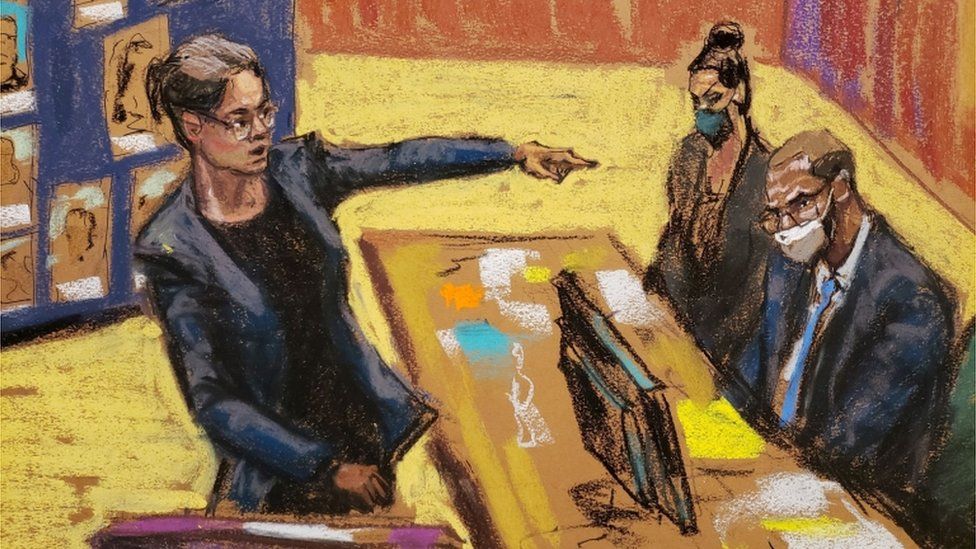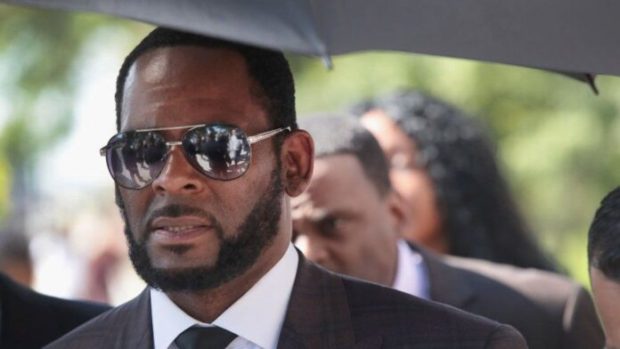Singer R. Kelly has been found guilty of exploiting his superstar status to run a scheme to sexually abuse women and children over two decades.
Eleven accusers – nine women and two men – took the stand over the searing six-week trial to describe sexual humiliation and violence at his hands.
After two days of deliberation, the jury found the US star guilty on all nine charges he was facing.
Sentencing is due on 4 May and he could spend the rest of his life behind bars.
The jury found Kelly, whose full name is Robert Sylvester Kelly, was the ringleader of a violent and coercive scheme that lured women and children for him to sexually abuse.
The singer – most famous for the hit songs I Believe I Can Fly and Ignition (Remix) – was also found to have trafficked women between different US states.
Along with eight counts of sex trafficking, Kelly was found guilty of racketeering – a charge normally used against organised crime associations.
During the trial, prosecutors detailed how his managers, security guards and other entourage members worked to assist him in his criminal enterprise.
The court also heard how Kelly had illegally obtained paperwork to marry Aaliyah when she was 15 in 1994, seven years before the singer died in a plane crash.
The certificate, leaked at the time, listed Aaliyah’s age as 18. The marriage was annulled months later.
Her 1994 debut album, Age Ain’t Nothing But a Number, was produced and written by R. Kelly.
 IMAGE SOURCE,REUTERS
IMAGE SOURCE,REUTERSOne woman who testified that Kelly imprisoned, drugged and raped her said in a written statement after the verdict that she had “been hiding” from Kelly due to threats made against her since she went public with her accusations.
Another woman who testified in court, Lizette Martinez, said she was “relieved” by the verdict.
“I’m so proud of the women who were able to speak their truths,” she added.
Legal documents have revealed the mental torment that Kelly subjected his victims to. They were not allowed to eat or use the bathroom without his permission, he controlled what clothes they wore and made them call him “Daddy”.
Gloria Allred, a lawyer who represented several victims, told reporters: “I’ve been practising law for 47 years. During this time, I’ve pursued many sexual predators who have committed crimes against women and children.
“Of all the predators that I have pursued, Mr Kelly is the worst.”
At a news conference outside the court on Monday, prosecutor Jacquelyn Kasulis said that the jury had sent a message to other powerful men like Kelly.
“No matter how long it takes, the long arm of the law will catch up with you,” said Ms Kasulis.
The verdict comes 13 years after Kelly was acquitted of child pornography charges after a trial in the state of Illinois.
Many of the allegations heard in the trial were first laid out in the 2019 documentary Surviving R Kelly.
Victims were sometimes selected from his concert audiences or were enticed to join him after being offered help with their fledgling music careers after chance encounters with the singer.
But after joining his entourage, they found that they were subjected to strict rules and aggressively punished if they violated what his team had dubbed “Rob’s rules”.

A swift verdict after decades of waiting

This was a swift decision by the jury of seven men and five women.
They took nine hours over two days to reach a verdict, meaning they must have been fairly united in their examination of the evidence.
Right before the verdict was read, a handful of R. Kelly’s fans blasted his music outside the courthouse. I asked them how they felt after he was found guilty. They were visibly sad and told me they still supported him.
On the other hand, R. Kelly’s victims are feeling some measure of comfort.
One – who remained anonymous throughout the trial – issued a statement saying she felt like she could now start the healing process. This verdict no doubt hinged on their testimony and willingness to recount personal trauma.
For decades these black women kept asking when they would be heard, when their voices would matter. This conviction is their Me Too victory.

Kelly’s lawyer Deveraux Cannick told reporters the singer did not expect to be found guilty.
“The government cherry-picked their version that they thought would support the continuation of the narrative,” said Mr Cannick. “Why would he expect this verdict given all the inconsistencies that we saw?”
Kelly is separately facing trial in Chicago on child sex images and obstruction charges. He is also due to face sex abuse charges in Illinois and Minnesota.
At least two former Kelly associates have pleaded guilty in separate cases related to attempts to silence Kelly’s accusers.
 Home Of Ghana News Ghana News, Entertainment And More
Home Of Ghana News Ghana News, Entertainment And More





